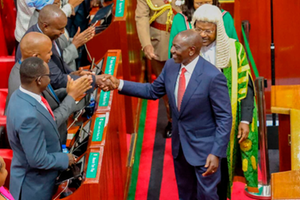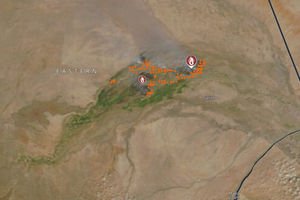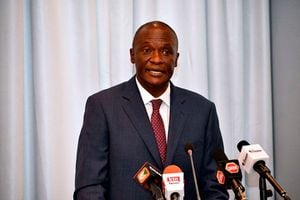2024 — Year we crossed climate danger line

In 2024, global temperatures rose more than 1.5°C above pre-industrial levels.
What you need to know:
- Heat waves, floods, droughts, and wildfires are disrupting lives across the globe.
- Climate change affects us all, but it also allows us to unite and build a more sustainable future.
Last year, the world reached a sobering milestone as global temperatures rose more than 1.5°C above pre-industrial levels. This is not just a technical target or an abstract statistic; it is a warning for humanity. Crossing this line signals that we have entered dangerous territory, where climate disasters become more severe and unpredictable.
As 2025 starts, the impacts are already inescapable. Heat waves, floods, droughts, and wildfires are disrupting lives across the globe. The question we must now grapple with is what this milestone means for us and how we can respond effectively.
The 1.5°C limit is not a figure plucked out of thin air. It is a threshold backed by science, representing the point where the effects of climate change become increasingly difficult to manage. Beyond this, ecosystems may face irreversible damage, weather patterns will grow more extreme, and communities already struggling with poverty and inequality will suffer even more.
For over a century, human activities such as burning fossil fuels and cutting down forests have been trapping heat in the atmosphere. Unfortunately, despite decades of warnings, action has been delayed, leaving us to deal with the consequences now.
Climate disasters
In 2024, the impacts of climate change were painfully clear. Europe faced relentless heat waves that sparked wildfires in Greece and Spain, consuming vast lands and displacing families. South Asia saw devastating monsoon rains that displaced millions in Pakistan and Bangladesh, while East Africa struggled with a prolonged drought that deepened food insecurity. In the United States, Hurricane Otis wreaked havoc on Florida and Louisiana. Currently, California is suffering one of its worst wildfire seasons
These disasters are not isolated incidents; they are glaring reminders that climate change is no longer a distant threat — it is affecting everyone, everywhere, now.
Global leaders had a chance to address this crisis at COP29, the annual climate summit, held in Baku, Azerbaijan. Hopes were high, but the outcome was deeply disappointing. Wealthy nations fell short of their promise to deliver $100 billion annually to help poorer countries adapt to climate change.
Even more frustrating was the failure to establish a loss and damage fund to assist countries already facing destruction from climate disasters. This left vulnerable nations to fend for themselves against overwhelming odds, deepening the divide between the Global North and South.
But we cannot let the failures of 2024 define us. This year, 2025, must be the turning point. To tackle the crisis head-on, we need to act on two fronts: cutting greenhouse gas emissions and adapting to the changes. Governments must prioritise renewable energy sources such as solar and wind, phasing out fossil fuels and greening industries, transport and agriculture.
Stabilise the climate
At the same time, vulnerable communities need urgent support to cope with rising sea levels, extreme weather and food and water shortages. Stronger flood defences, drought-resistant crops and improved public health systems are no longer optional but essential.
None of this can happen without adequate funding. Wealthy nations have a responsibility to fulfil their promises and provide financial support to developing countries. This includes creating a functioning loss and damage fund.
Crossing the 1.5°C threshold was a wake-up call, not a reason to despair. It is a chance to reflect and act. The choices we make this year will determine whether we can stabilise the climate and protect the most vulnerable or allow the crisis to worsen. The time for hesitation is over. We must act boldly, urgently, and together.
Climate change affects us all, but it also allows us to unite and build a more sustainable future. Let 2025 be the year we rise to the challenge for our planet, our communities, and the generations to come.
Ms Wainaina is a Norec Fellow and a programme consultant at the Kenyan Section of the International Commission of Jurists





